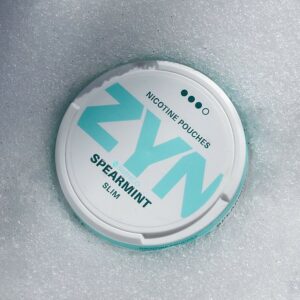First “reefer madness.” Now “ZYN-sanity?”
U.S politicians and anti-nicotine activists want a crackdown on ZYN, a popular cigarette alternative, claiming that it’s a gateway to smoking for teens. However, the available data show almost no teens actually use the product.
It’s yet another example, public health experts say, of anti-tobacco panic harming efforts to make it easier to get smokers to put down their cigarettes for good.
Nicotine pouches are no bigger than a piece of gum. They consist of a small bag filled with nicotine, the naturally occurring additive found in tobacco, and other ingredients. They come in flavors like mint and coffee. Users place the pouch between their cheek and gum while the contents are absorbed. Unlike chewing tobacco, people don’t have to spit but do need to throw away the pouch once it’s been used.
The most popular brand in the U.S. is ZYN. Originally introduced to America by Swedish Match in 2014, ZYN sales leaped to around 350 million cans last year. Philip Morris International (PMI), which purchased the company in 2022, has estimated that sales could hit more than 520 million cans this year.
The question is whether this is good news or bad for American public health policy?
Given the damage done by smoking traditional cigarettes, many medical professionals say anything that can get smokers to quit is a net benefit. They take the “harm reduction” approach, as opposed to the “prohibitionist” stance that all recreational nicotine products should be banned.
“It is kind of mind-boggling because public health doesn’t have a problem with harm reduction for other drugs or other behaviors,” Dr. Michael Siegel at Tufts University School of Medicine in Boston told InsideSources.
He compared the outrage over nicotine pouches to the reefer madness of the 1930s about marijuana. “It’s the failure to recognize that prohibition of a product completely does not work,” he said. “It’s better off for them to be using less harmful products than more harmful products.”
As with the case of vaping, the focus of the ZYN backlash is concern that kids are being targeted, particularly on social media. There on “Zynfluencers,” fans of the new product, on platforms like TikTok and Instagram that are popular with teens, and upset moms have taken to the op-ed pages of the New York Times to express their outrage.
On online booster is former Fox News host Tucker Carlson, who appeared on social media with the Nelk Boys, a Canadian YouTube group with more than eight million subscribers. In a video featuring a gigantic package of ZYN, Carlson quipped, “The volume of nicotine here could save the world.”
Senate Majority Leader Chuck Schumer (D-N.Y.) took umbrage with ZYN’s popularity weeks after the Carlson-Nelk Boys video.
“I’m delivering a warning to parents because these nicotine pouches seem to lock their sights on young kids, teenagers and even lower, and then use the social media to hook them,” Schumer said. He asked for a federal probe of ZYN’s marketing practices.
Despite the public panic, the Food and Drug Administration’s 2023 National Youth Tobacco Survey found just 1.5 percent of middle and high school students used nicotine pouches. And while the FDA’s Center for Tobacco Products promised to monitor youth use of nicotine pouches, it found no evidence that teens were drawn to them.
As for the marketing issue, a PMI spokesperson pointed out to InsideSources that it’s already illegal to sell tobacco products like cigarettes or nicotine pouches to people under the age of 21. And the company doesn’t engage with social media influencers like Tucker Carlson, so they have no ability to control what people are saying on social media.
What can be done, however — as evidenced by the revelations regarding TikTok and the power of its algorithms — is for social media companies to suppress content about tobacco products in the feeds of younger users.
“Prohibition didn’t work in the 1920s, why would anyone think it will work in the 2020s?” one industry insider told InsideSources on background. “Parents are angry about social media, and those companies can do something about the content kids see.”
Meanwhile, say public health experts, the focus is on the wrong issue. It’s cigarette smoking, not nicotine, that’s killing thousands of Americans every year.
“I think it’s been like indoctrination into thinking nicotine mistakenly is a dangerous product,” Dr. Jeffrey Singer, a medical doctor and senior fellow at the Cato Institute, told InsideSources.
Why did Schumer put ZYN and other nicotine pouches in the crosshairs? Alex Clark with Consumer Advocates for Smoke-free Alternatives Association blamed politics. “It’s something that politicians can beat up on and look tough.”


